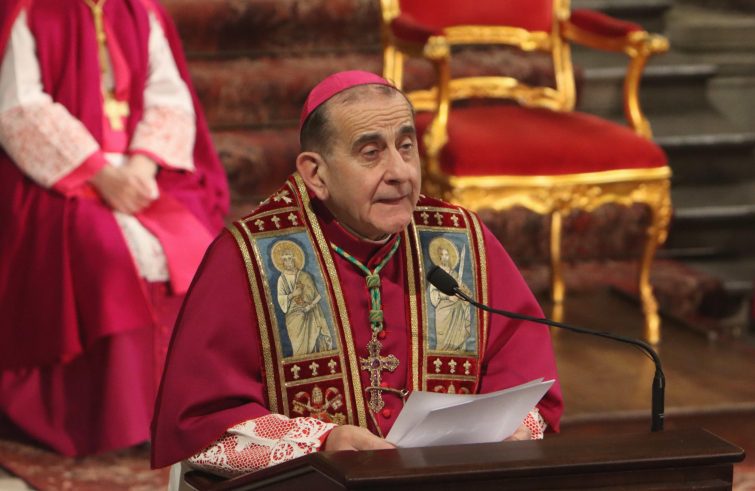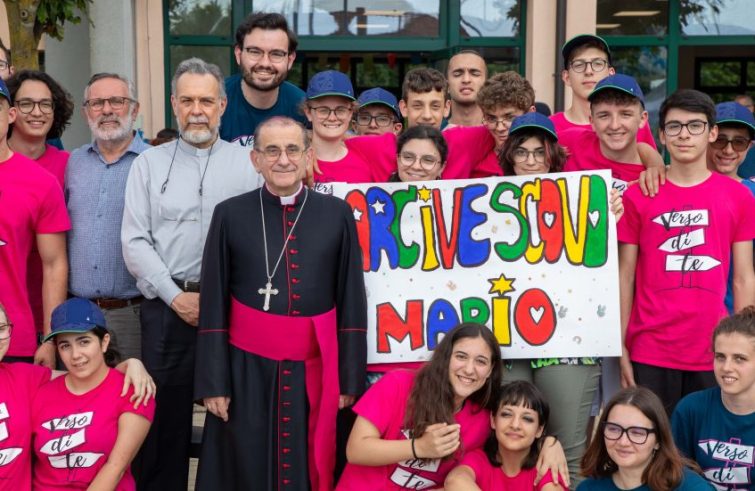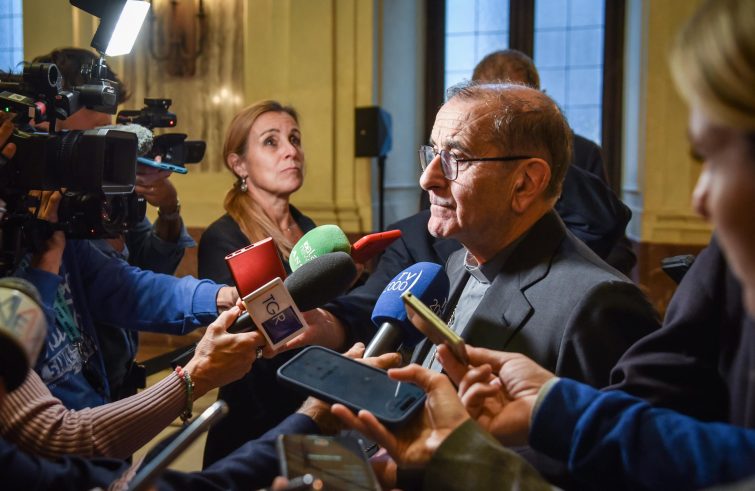
“This is not the season of new fruit”, but “the Holy Spirit is forming saints of the change of epoch,” In view of the first Assembly of the Synodal Journey, to be held in Rome from 15 to 17 November, Monsignor Mario Delpini offers some interpretative keys. He was ordained a priest in 1975, appointed auxiliary bishop in 2007. In 2017 Pope Francis appointed him as the new head of the Archdiocese of Milan. He is also the President of the Episcopal Conference of the Region of Lombardy. His reflections on the Italian Church extend beyond the ecclesial reality of Milan and its region. He underlined the widespread secularisation, the difficulties and the delays that the Church, the clergy and the laity are confronted with, while at the same time not neglecting to “recognise that the Church is facing a crisis of faith.”
Is it possible to make a preliminary assessment of the first three years of the synodal journey in the world’s largest diocese?
We ask ourselves: what kind of zeal, what kind of awe, what kind of fear characterises our parishes and the largest diocese in the world? At a superficial glance, the signs of fatigue and discouragement are most apparent.
According to official figures the numbers are dwindling, the distance between the Church and its surrounding world is growing. But a closer gaze, one that sees the truth of the Church, will see circumstances and people in the light of God.
So, for example, the Holy Spirit sees the crowds attending the deanery Synod meetings, full of wonder at the good they see everywhere, at the generous, hardworking and compassionate charity at work in our area. The Spirit sees the infinite need for consolation that weeps throughout the world. The Spirit sees people’s faith in the Church, despite the fact that many insist on portraying it as out of touch, outdated, in decline. The Spirit sees the seedlings of young people, eager to take part, eager to step forth and share responsibility in the participatory organisms of every community.
What about the Christian community? What about the lay faithful? Consecrated persons? The clergy?
The Spirit hears the lament and the sigh of Christian communities, laity, priests, deacons, consecrated men and women, who perceive the inadequacy of resources: they experience frustration at unfulfilled calls, at holy but perhaps frayed words, at empty spaces without purpose. They wonder at the crowds who ask for the sacraments, who praise the preachers, who demand priests: are these signs of the future or the inertia of the past?
Is it true, as we are told, that priests are the least committed to the synodal way?
Priests are subjected to too many demands and too much criticism. Priests, including myself, have been required to participate in too many consultations: the consultations promoted for the Synod of Bishops, the consultations for the narrative phase of the Italian Church’s journey, the diocesan guidelines for the implementation of the smaller synod on the “Church of the nations.” One has to admit that ‘three synods simultaneously’ are somewhat too many. The presbyters, who are expected to hold everything together, have several reasons for scepticism. Nevertheless, many priests have not backtracked, along with men and women touched by the fire of an urgent mission beyond the confines of the parish or their own community.
- (Foto chiesadimilano.it)
- (Foto ANSA/SIR)
What are the difficulties and the critical issues that emerged so far?
In our rapidly changing society, in the epochal newness of a multi-ethnical presence, and faced with the growing epidemic of arrogant individualism, the slower pace of thought and action on the part of Christian communities, too preoccupied with preserving the established order, has come to the fore. The urgency of joining forces is met with resistance caused by parochialism and inertia, individualism and self-centredness. The innovative power of the younger generation is hampered by fear and disorientation.
What are the indications of novelty, the motivating factors in the transition from the “narrative” to the “sapiential” phase?
The Church is mission. The mission of the Church is for the entire world. The world has changed, and that is why the mission, and thus the Church, must change. In recent years, the Church of Milan embarked on a journey characterised by questions, reforms and effort.
The mobility of people and the migration of peoples are among the most conspicuous changes. In our country, we are witnessing the growth of a multi-ethnic population.
That is why the Church of Milan has described itself as the “Church of the nations”. In fact, among those who have migrated from many lands, many believe in the one Lord and are thus called to be one heart and one soul, and therefore one Church. One mission to proclaim the Gospel today, here and now. The way of proclaiming the Gospel to a world that, now as in the past, is not ready to hear it, remains a way of wisdom and prophecy.
Has the diocesan Church changed?
The narrative that acknowledges the Catholic Church as a far-reaching and incisive presence across the territory is indicative of an evolution characterised by mobility and multiple affiliations. A sapiential understanding suggests that in order to inhabit larger territories and seemingly unfamiliar contexts of daily life, it is necessary to bring together the ubiquitous presence of parishes and pastoral ministry, however laboriously. The creation of pastoral communities, initiated some time ago in the Diocese of Milan, is born of the initiative to unite the life of the parish with the life of the people, who are always on the move and whose “dwelling place” is everywhere.
Your Excellency, many people are still distant from the Christian community, even though they appreciate its services: is the Church becoming a “service station”, irrelevant in terms of thought, choices and daily life?
The process of secularisation can be seen as an expression of defeat and decline. The wisdom of the Gospel sees in the images of salt and fire the fulfilment of Jesus’ words announcing the Kingdom. The question then is not how many of us there are, but whether the salt retains its flavour and the flame continues to burn.
Is this fire burning?
An audacious intuition inspired by the Holy Spirit gave birth to the “Barnabas Groups” in the Church of Milan. The awe and joy of seeing God’s Spirit at work then led to the creation of deanery synod assemblies, a mission-inspired synodal practice. These meetings are meant to embody our fidelity to the Lord who continually sends his disciples to proclaim the Gospel and sow peace: lambs surrounded by wolves, weakness where the power of God may perhaps be manifested. This is what we have to offer: the Gospel of Jesus.
In your view, what fruits can the Synod bring for the life of the Church and for Christian witness in this “change of epoch”?
This is not a season of new fruits. Of course, I believe that the Spirit will make the Church as beautiful as the Bride of the Lamb. Beauty is the gift we invoke. So I imagine that there are and will be saints. The Holy Spirit is forming the saints of this “change of epoch “.
What is your vision of the future of the Churches in Lombardy at the beginning of the third and final stage of the Synodal Journey, the “prophetic” stage, and as the Jubilee Year 2025 approaches?
The men and women of our time are in a hurry, they lead fast-paced lives. Where are they going? Should we follow them in order to be “abreast of the times”? Prophecy is more of a challenge. It is a bold and perhaps unpopular word. We have nothing to say except that Jesus is risen, he is alive, he is making us partakers of his life.
What is needed for these men and women to be expressions of a truly “missionary” Church, one that sows hope and is attuned to the challenges of our time?
The bedrock of our faith and mission, the Risen Jesus, appears to have been reduced to a notion found in the Catechism, and one with little relevance. Our message to those who are always running but don’t know where to is that together we are moving toward life, the life of God.
As Christians, we are original. Those who consider themselves intelligent often suggest scepticism and resignation as the height of intelligence. However, we believe that true wisdom is Jesus, the foundation of Hope.
Furthermore, when we speak of Jesus, we must proclaim that hope is not a destiny, but a vocation. It is the word of Jesus that calls each one of us to follow Him, to live with Him and for Him, and to be like Him in some way. Three key words: hope, vocation and love.












